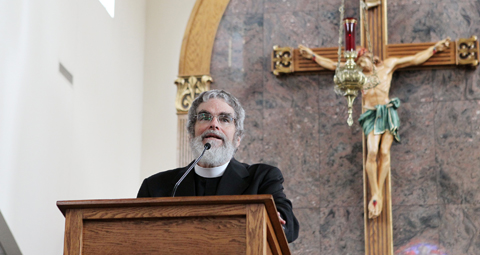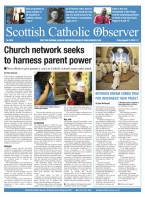BY Peter Diamond | July 27 2018 | ![]() 0 COMMENTS
0 COMMENTS ![]() print
print

‘Embrace science—don’t let the atheists steal it from us,’ Pope’s astronomer tells Catholic Scots
Publication Date: 2018-07-27
The Vatican’s top astronomer, issued the call to Scottish Catholics at the Lauriston Jesuit Centre, Edinburgh, when he delivered a talk titled ‘Adventures of a Vatican Astronomer.’
‘Embrace science and don’t let the atheists steal it from us,’ the director of Vatican Astronomy told Scottish Catholics last week.
Br Guy Consolmagno, the Vatican’s top astronomer, issued the call to Scottish Catholics at the Lauriston Jesuit Centre, Edinburgh, when he delivered a talk titled ‘Adventures of a Vatican Astronomer.’
The top scientist of the Holy See, who is originally from Detroit, in the US, has worked under St Pope John Paul II, Pope Emeritus Benedict XVI and was appointed director of Vatican astronomy by Pope Francis in 2015.
After speaking to a crowd of 180 people in Edinburgh on Thursday July 19, Br Consolmagno said: “My most important audience when speaking around the world are lay Catholics who are afraid of science or have only been informed of science up until they leave school.
“They hear too many people who want to bash religion and think they can use science to do it.
“Catholics should not be afraid of science, instead they should embrace it—don’t let the atheists steal it from us, we started it, it’s ours.”
The Jesuit revealed that by learning more about science we can learn so much more about God.
He added: “Religion invented science; our universities invented science and gave the justification of doing it by the fact that it’s a way of studying God. I think all Catholics should at least in an amateur sense become more aware of the physical universe and more aware of what’s really happening in science.
“Real science is this glorious creative fun activity, which frankly you don’t have to be a scientist to enjoy.”
When asked what young Scots in Catholic schools should do to get involved more in science, Br Consolmagno said: “Scotland has a great history of scientists.
“In fact, Hermann Bruick, who was a German-born astronomer that worked at the Vatican Observatory in 1936, fled to Scotland during World War Two and years later in 1957 became the Astronomer Royal for Scotland, whilst teaching at Edinburgh University.
“To young Catholics interested in science I would say embrace it because it is your heritage. To be a scientist is your heritage, to be a Catholic is your heritage and the two really support each other.
“To my mind there were three great physicists in the history of physics: Einstein, Newton and James Clerk-Maxwell.
“Maxwell is probably the least well-known but his work created everything we know in the 20th century; he made Einstein possible.
“He wasn’t Catholic but was a deeply religious person and most importantly he was Scottish.”
A leading scientist at the University of Edinburgh, Ian Chambers, welcomed Br Consolmagno’s comments stating that science can be a way of serving the Church and wider community.
Professor Ian Chambers of Pluripotent Stem Cell Biology, said: “Science is like a puzzle, where we can try to find out how the world around us works. But being a scientist need not only be about studying the world. It can also be a way of serving your communities by using your talents to advance knowledge and so help others.
“I would agree that Church was interested in knowledge and were therefore responsible sponsors of science in order to learn more about the world and travel and preach teachings.
“It’s important that dialogue is encouraged and developed between the Church and science in a respectful manner in the years to combat the perception that a main aim of science is to bash religion.”
Br Consolmagno stated that the Church has an obligation to nurture science. He said: “You can find science directly in scripture—not only the Genesis story but as directly as Paul’s letter to the Romans: Chapter 1 verse 20: ‘For since the creation of the world God’s invisible qualities—his eternal power and divine nature—have been clearly seen, being understood from what has been made, so that people are without excuse.’
“And this ties in with St Ignatius’ spirituality of ‘finding God in all things,’ which is why the Jesuits in particular are so often attracted to being astronomers.”
Part of the reason the Vatican has an observatory was because, in the late 1800s, having a national observatory was a symbol of nationhood, and the Vatican was at the time trying to establish that it was a country independent from Italy.
Since then the Church has nurtured scientists such as Mgr Georges Lemaître, who first proposed what became known as the ‘Big Bang theory’ and who last week was celebrated by Google on its homepage to mark what would have been his 124th birthday.
Br Consolmagno said he believes it’s more powerful if the secular world picks up on the scientific work of the Catholic Church.
“The glorious thing is that Lemaitre’s story is getting out there—the fact that Google honoured him on his birthday.
“And it’s much more powerful when we let the rest of the world discover it than us trying to sell it, not that there is anything wrong with that—it’s just good tactics.
“We’ve got nothing to be ashamed of and lots to be proud of but it works best when someone else blows our horn for us.”
Secular society may well be afraid of the scientific work of the Church according to Br Consolmagno and he said strands of anti-Catholicism in British society are responsible for an ignorance of the Church’s role in scientific progress.
The Jesuit said he is ‘not worried’ about the secular world ignoring the Church’s contribution to science, saying that ‘in a bizarre way I almost welcome it because it makes me realise the anti-religion world thinks we’re worth being afraid of—and that’s a point of pride.’
“You find that perhaps a bit in Britain because there is still this sort of anti-Catholicism that is fashionable,” he said. “It’s not fashionable in most parts of the world but it is here.
“Yet even here one of the most honoured scientists in Britain right now is a meteorite scientist called Monica Grady. She even [appeared on] Desert Island Discs and she is a devout Catholic and scientist.”










